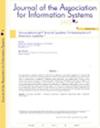作为集体社会行动的数字化转型
IF 5.5
3区 管理学
Q1 COMPUTER SCIENCE, INFORMATION SYSTEMS
引用次数: 1
摘要
数字技术正在重塑组织和我们作为社会成员的生活。由此产生的变化通常被称为“数字化转型”(DT)——一个已被证明难以从理论上定义和解释的概念。这一点尤其正确,因为DT的性质和范围正在超越明确定义的组织边界。今天,信息技术(IT)正变得越来越容易获得,并与更多的社会成员相关,从而为组织之外的以前看不见的变革创造了潜力。因此,需要新的理论视角来解释更广泛的社会行为者是如何煽动并受到IT引发的变革的影响的。我们将DT概念化为集体社会行动,这是一种新的视角,旨在将DT研究的重点扩展到组织之外作为其分析单位,并以社会行动者、他们的行动及其影响为中心的互补视角。我们将数字化转型的类型学描述为一种集体社会行动,它考虑了转型的轨迹(什么?)、社会行动者的类型(谁?)和潜在机制(如何?)。总的来说,这四种理想类型构成了一种新的理论,有助于理解、解释和预测DT作为集体社会行动如何在正式定义的组织边界内外发生。本文章由计算机程序翻译,如有差异,请以英文原文为准。
Digital Transformation as Collective Social Action
Digital technologies are reshaping both organizations and our lives as members of society. The resulting changes are often referred to as “digital transformation” (DT)—a concept that has proven difficult to define and explain theoretically. This is especially true because the nature and scope of DT is evolving beyond clearly defined organizational boundaries. Today, information technology (IT) is becoming increasingly accessible and relevant for many more members of society, creating the potential for previously unseen transformations beyond organizations. Accordingly, new theoretical lenses are needed to explain how a broader set of social actors instigate and are affected by transformative change induced by IT. We conceptualize DT as collective social action, a novel lens that aims to expand the focus of DT research beyond organizations as its unit of analysis, with a complementary perspective centered on social actors, their actions, and their impact. We delineate a typology of digital transformation as collective social action that considers the locus of transformation (what?), types of social actor(s) (who?), and the underlying mechanisms (how?). Collectively, the four ideal types constitute a new theory to help apprehend, explain, and predict how DT as collective social action occurs within and outside formally defined organizational boundaries.
求助全文
通过发布文献求助,成功后即可免费获取论文全文。
去求助
来源期刊

Journal of the Association for Information Systems
工程技术-计算机:信息系统
CiteScore
11.20
自引率
5.20%
发文量
33
审稿时长
>12 weeks
期刊介绍:
The Journal of the Association for Information Systems (JAIS), the flagship journal of the Association for Information Systems, publishes the highest quality scholarship in the field of information systems. It is inclusive in topics, level and unit of analysis, theory, method and philosophical and research approach, reflecting all aspects of Information Systems globally. The Journal promotes innovative, interesting and rigorously developed conceptual and empirical contributions and encourages theory based multi- or inter-disciplinary research.
 求助内容:
求助内容: 应助结果提醒方式:
应助结果提醒方式:


